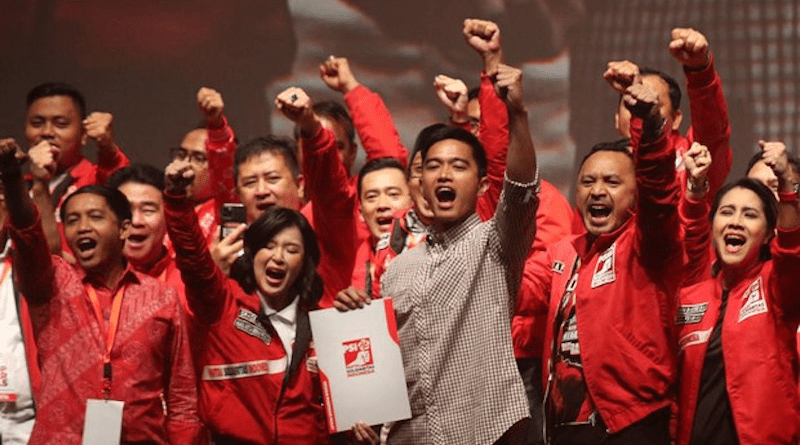Indonesia: President’s Influence In Son Being Named Small Party’s Leader – Analysis
By BenarNews
By Nazarudin Latif and Pizaro Gozali Idrus
A small Indonesian political party’s move to name the youngest son of President Joko “Jokowi” Widodo its chairman shows the Indonesian leader plans to influence national affairs after leaving office next year, some observers said.
On Monday, political newbie Kaesang Pangarep, 28, was named Indonesian Solidarity Party (PSI) chairman just two days after joining the party.
Jokowi had no significant role in his own Indonesian Democratic Party of Struggle (PDIP), and so was no longer comfortable there, Ujang Komarudin, executive director of the think tank Indonesia Political Review, told BenarNews.
“Jokowi’s blessing and intervention are likely behind the appointment of Kaesang as PSI’s chairman,” he said, adding that the party would do anything for the popular current president.
“The plan has been not for Kaesang to join PDIP, but for him to become PSI chairman,” he said.
PSI was banking on the president’s popularity – the so-called “Jokowi effect” – when it made Kaesang its chairman, said Denny Januar Aly, founder of polling agency Lingkaran Survei Indonesia.
“He has no experience in public office or any key role in a political party. So what was the reason for PSI leaders to pick him as chairman? The answer is simple – they were hoping for a ‘Jokowi effect’,” Denny said.
Other analysts have noted that Jokowi has been distancing himself from the PDIP and its interests as he prepares to leave office and he tries to create his own political force.
Jokowi has not released a statement on Kaesang’s appointment.
Kaesang said his father is one of his inspirations.
“He is someone I love and respect very much and I want to follow his footsteps in politics for the good of the country,” Kaesang said in a statement Monday.
“I hope PSI can become a political home for young people who want to participate in politics and make a positive change for Indonesia,” he said.
PSI was founded in 2014, shortly after Jokowi’s first presidential victory and claims to represent the interests of women, youth and minorities. It also supports Jokowi’s policies and endorsed him in the 2019 presidential elections.
Jokowi will be out of office in 2024 because presidents cannot serve more than two terms.
PSI has not achieved significant electoral success at the national level. It failed to secure any seats in the national parliament in the 2019 election, but managed to win some in the provincial and district legislatures.
Kaesang would face a tough challenge making PSI a parliamentary party, said Wasisto Raharjo Jati, a political researcher at the National Research and Innovation Agency.
“It requires a lot of effort and a long process,” he told BenarNews.
Deteriorating relations?
Some analysts said Kaesang’s decision reflected a rift between Jokowi and his party, the PDIP, which is the largest party in the ruling coalition.
Jokowi wouldn’t have let his son join PSI otherwise, said Hendri Satrio, a political analyst at Paramadina University.
“Few expected Jokowi to act like this. PDIP supported him twice as mayor of Solo, governor of Jakarta, and twice as president. It turns out that Jokowi took an unexpected political step,” he told BenarNews.
The PDIP had also backed the president’s other son, Gibran Rakabuming, who is the mayor of Solo in Central Java province, and his son-in-law, Bobby Nasution, who is the mayor of Medan in North Sumatra.
Said Abdullah, a PDIP executive board member, said his party was not affected by Kaesang’s political move.
“We have many people who can replace members who leave. There are dozens, hundreds, thousands and even millions of them,” Said told BenarNews.
Analysts have said Jokowi’s relationship with PDIP has deteriorated in recent months and the rift has become more apparent as supporters pressure him to endorse a successor who can continue his policies and programs.
Many Jokowi supporters have expressed their disappointment with the PDIP, accusing the party of being too controlling and interfering with the president’s agenda.
For its part, the PDIP has repeatedly denied there is any tension between Jokowi and its chairwoman Megawati Sukarnoputri, a former president who is widely regarded as the kingmaker in Indonesian politics.
As a party that traditionally appealed to nationalists in Indonesia, PDIP placed absolute power in the hands of Megawati, the daughter of Indonesia’s founding father and first president Sukarno, said Ujang of Indonesia Political Review.
The Feb. 14, 2024, presidential election is expected to be a race among PDIP candidate and former Central Java Gov. Ganjar Pranowo; Defense Minister Prabowo Subianto; and ex-Jakarta Gov. Anies Baswedan.

